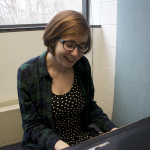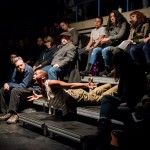From February 2nd to the 10th, “The Black Magic of Living,” part of the Cooper Series, will take place at Swarthmore College. Artist-scholars Thomas DeFrantz and Ni’Ja Whitson will be in residency giving talks, master classes, and performances in a multi-dimensional meditation on being Black in America. DeFrantz’s and Whitson’s dance performances were inspired by the poetry of Jean Toomer and Marlon Riggs, respectively, two artists who pushed beyond the traditional boundaries of their mediums to tell stories of the origins and lives of African Americans at specific times in history. The resulting performances are complex, layered examinations of some of the biggest questions facing American society today.
Thomas DeFrantz’s work, CANE, explores stories of African-American sharecropping. Inspired by Harlem Renaissance author Jean Toomer’s 1923 text of the same name, CANE uses a digitally-constructed canefield to create a “responsive environment” that the dancers interact with. Toomer’s text was highly experimental for its time, combining poetry, drama, stories, and sketches to tell stories of the origins and experiences of African-Americans in the United States. In the way that Toomer pushed beyond traditional literary boundaries, DeFrantz stretches typical expectations of visual art and, in this case, dance. His use of technology to create the canefield – the piece of the dance that would most immediately place the work in a specific historical context – gives credence to the idea that the present cannot be understood without first understanding the past. DeFrantz and his company will perform CANE on February 2 and 3 at 8:00 PM in LPAC’s Frear Ensemble Theater.
Ni’Ja Whitson’s A Meditation on Tongues is a more physically expansive piece. At one point, both dancers take turns reciting a speech about the inability to “go home” as a black gay man. While one speaks, the other runs around the entire performance space before trading places with the speaker. As they repeat this over and over, their speaking becomes more laborious, symbolizing the physical and emotional strain of alienation. A Meditation on Tongues is a performance art adaptation of Marlon T. Riggs’s film, Tongues Untied. Whitson’s piece explores ideas and questions about loss at the height of the AIDS crisis, while reimagining images of Black and Queer masculinities. Whitson’s work also relies heavily on history to present an altered picture of the present, and will be performed in LPAC’s Frear Ensemble Theater on February 9 and 10 at 8:00 PM.
By framing these questions of identity in different historical contexts, Whitson proves that finding answers is difficult if one simply looks at a single event or time period. History is a living entity, and every event must be considered not only in its present context, but in terms of the ideas, beliefs, and circumstances that led to it over time. Both of these artists have created works that channel this idea toward the concept of being Black in America. Their pieces are visceral and challenging, and ask as many questions as they answer.
The Cooper Series is supported by the William J. Cooper Foundation, which provides a varied program of lectures, performances and exhibitions which enriches the academic work of Swarthmore College. The Foundation was established by William J. Cooper who specified that the income from his gift should be used “in bringing to the college eminent citizens of this and other countries who are leaders in statesmanship, education, the arts, sciences, learned professions and business.” Planning for next season is currently underway.
From February 2nd to the 10th, both artists will be giving talks and master classes in addition to their performances. Information can be found here:https://www.swarthmore.edu/cooper-series/black-magic-living.
Gabriel Hearn-Desautels ’20




